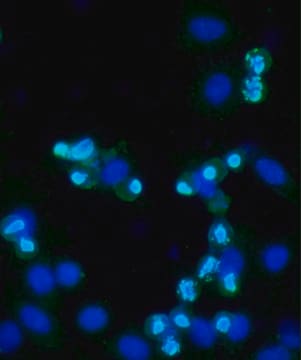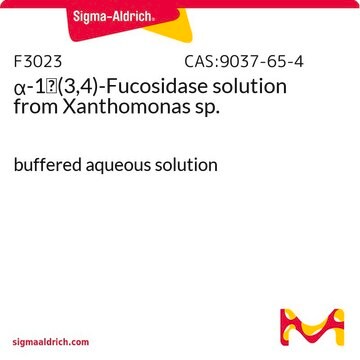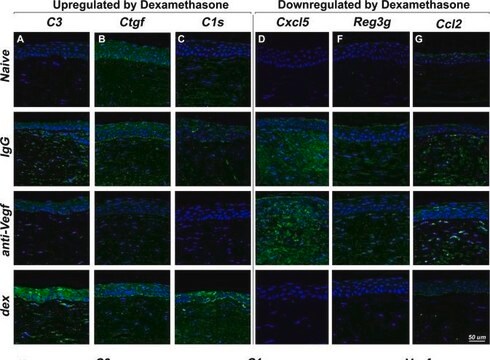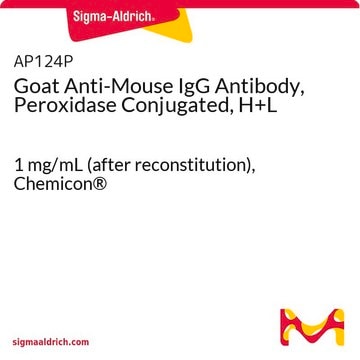H9908
Monoclonal Anti-phospho-Histone H3 (pSer28) antibody produced in rat
~0.5 mg/mL, clone HTA28, purified immunoglobulin, buffered aqueous solution
Synonyme(s) :
Monoclonal Anti-H3S28p
About This Item
Produits recommandés
Source biologique
rat
Niveau de qualité
Conjugué
unconjugated
Forme d'anticorps
purified immunoglobulin
Type de produit anticorps
primary antibodies
Clone
HTA28, monoclonal
Forme
buffered aqueous solution
Poids mol.
antigen 15 kDa
Espèces réactives
bovine, mouse, hamster, human
Conditionnement
antibody small pack of 25 μL
Concentration
~0.5 mg/mL
Technique(s)
flow cytometry: suitable
immunocytochemistry: suitable using 3.7% formaldehyde-methanol fixation
microarray: suitable
western blot: 0.5-1 μg/mL using whole extract of cultured human acute T cell leukemia Jurkat cells treated with Nocodazole.
Isotype
IgG2a
Numéro d'accès UniProt
Conditions d'expédition
dry ice
Température de stockage
−20°C
Modification post-traductionnelle de la cible
phosphorylation (pSer28)
Informations sur le gène
human ... H3F3A(3020) , H3F3B(3021) , HIST1H3A(8350) , HIST1H3B(8358) , HIST1H3C(8352) , HIST1H3D(8351) , HIST1H3E(8353) , HIST1H3F(8968) , HIST1H3G(8355) , HIST1H3H(8357) , HIST1H3I(8354) , HIST1H3J(8356) , HIST2H3A(333932) , HIST2H3C(126961) , HIST3H3(8290)
mouse ... H3f3a(15078) , H3f3b(15081) , Hist1h3a(360198) , Hist1h3b(319150) , Hist1h3c(319148) , Hist1h3d(319149) , Hist1h3e(319151) , Hist1h3f(260423) , Hist1h3g(97908) , Hist1h3h(319152) , Hist1h3i(319153) , Hist2h3b(319154) , Hist2h3c1(15077) , Hist2h3c2(97114)
Description générale
Spécificité
Immunogène
Application
Actions biochimiques/physiologiques
H3 phosphorylation may contribute to proto-oncogene induction by modulating chromatin structure and releasing blocks in elongation. H3 dephosphorylation occurs quite rapidly after mitosis and serine-10/28 reo main unphosphorylated throughout the remainder of interphase. PP1 has been identified as the H3 phosphatase.
Forme physique
Notes préparatoires
Stockage et stabilité
Clause de non-responsabilité
Vous ne trouvez pas le bon produit ?
Essayez notre Outil de sélection de produits.
Code de la classe de stockage
10 - Combustible liquids
Classe de danger pour l'eau (WGK)
WGK 3
Point d'éclair (°F)
Not applicable
Point d'éclair (°C)
Not applicable
Certificats d'analyse (COA)
Recherchez un Certificats d'analyse (COA) en saisissant le numéro de lot du produit. Les numéros de lot figurent sur l'étiquette du produit après les mots "Lot" ou "Batch".
Déjà en possession de ce produit ?
Retrouvez la documentation relative aux produits que vous avez récemment achetés dans la Bibliothèque de documents.
Notre équipe de scientifiques dispose d'une expérience dans tous les secteurs de la recherche, notamment en sciences de la vie, science des matériaux, synthèse chimique, chromatographie, analyse et dans de nombreux autres domaines..
Contacter notre Service technique








